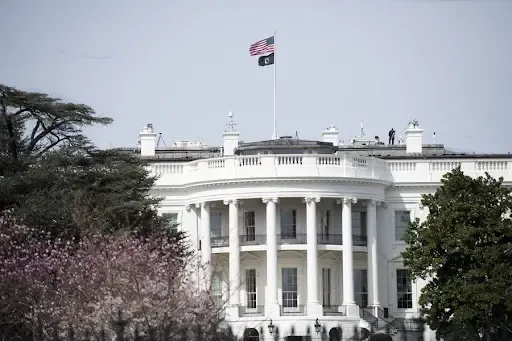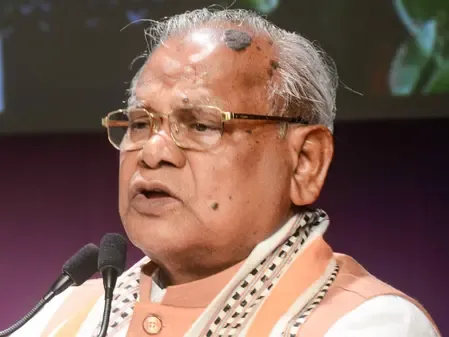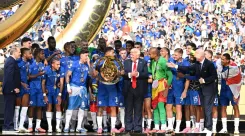Is the White House's H-1B Clarification a Reversal?

Synopsis
Key Takeaways
- The $100,000 fee for H-1B applications is a one-time charge for new visas only.
- Current H-1B visa holders are exempt from this fee when re-entering the U.S.
- The White House's clarification is viewed as a retreat from previous Trump administration policies.
- Legal challenges regarding the H-1B program are expected in the near future.
- Congress may need to intervene for substantial reforms to the H-1B program.
Washington, September 21 (NationPress) Following the White House's clarification to IANS regarding the $100,000 fee for an H-1B application being a "one-time fee" applicable solely to new visas, a prominent lawyer expressed that this represents a "walk back" from the Trump administration's stance on the matter.
In a one-on-one discussion with IANS, Steven Brown, a partner at the esteemed immigration law firm Reddy Neumann Brown PC, contended that this clarification deviates from the proclamation made by President Donald Trump last Friday.
"In my view, this is indeed a walk back from the previous statements, particularly those made by Secretary Lutnick and the proclamation's text. The proclamation does not make a distinction between new and existing H-1B visas; it essentially serves as an entry ban," he stated.
In a follow-up response to IANS, the White House confirmed that the "one-time fee" is only applicable to new visas, excluding renewals and current visa holders.
"This one-time fee pertains solely to the petition for new visas, not to renewals or existing visa holders. It will first take effect in the upcoming lottery cycle," a White House official clarified to IANS.
White House Press Secretary Karoline Leavitt also took to X, asserting that individuals who already "hold H-1B visas" and are currently outside the U.S. will not incur the $100,000 fee to re-enter. She emphasized that H-1B visa holders have the ability to leave and re-enter the country.
Brown remarked that while he awaits "official guidance," this clarification still offers a sense of "relief" for current H-1B visa holders.
"This brings a sigh of relief to those residing in the U.S. or working within its borders. People might find solace in knowing that perhaps this won't lead to the dire consequences expected based on the original proclamation's text. They may still have the chance to return. I think it’s a moment for everyone to take a deep breath and wait for further developments on Monday," he advised.
Brown noted the oddity of a signed proclamation being contradicted by social media posts from Trump administration officials, calling it a "weird" scenario where immigration law is being shaped through proclamations and subsequently interpreted through tweets.
A White House spokesperson reiterated to IANS that this policy aims to "discourage companies from abusing the system."
"President Trump vowed to prioritize American workers, and this pragmatic approach does just that by discouraging companies from exploiting the system and reducing wages. It also provides clarity to American businesses wishing to employ high-skilled workers who have faced systemic abuses," stated Taylor Rogers, the White House Spokeswoman.
On Friday, Trump had characterized the reduction in the H-1B visa program as an "incentive" to hire "American workers."
"We require skilled workers, and this effectively guarantees that," Trump asserted.
Commerce Secretary Howard Lutnick defended the initiative, indicating that the policy aims to deter companies from hiring foreign talent.
"The intention is clear: no longer will major tech companies or other large corporations be able to train foreign workers without significant cost. They will incur a $100,000 fee to the government, in addition to compensating the employee, making it economically unfeasible. The focus should be on training American graduates from our prestigious universities, rather than bringing in foreign labor to take jobs from our citizens. That’s the goal here—$100,000 a year for H-1B visas," he elaborated.
Brown underscored that despite the ongoing crisis, the proclamation is likely to face legal challenges.
"A significant amount of litigation is expected on this front. Corporations that have invested in skilled employees may choose to sue, as could individuals or organizations with standing representing immigrants," he stated.
He pointed out that an executive proclamation alone cannot resolve the underlying issues associated with the H-1B program, emphasizing the necessity for Congressional intervention.
"Congress must enact reforms, as immigration is a power vested in Congress. While some latitude has been granted to the executive branch, meaningful H-1B reforms will largely have to be legislated by Congress," he concluded.










